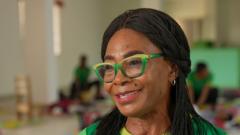In Nigeria, the lack of awareness and proper healthcare facilities for children with cerebral palsy creates significant challenges. Nonye Nweke, a single mother driven by her own daughter's struggle, founded the Cerebral Palsy Centre, which offers essential care and support to children in need. Despite financial constraints and societal stigma surrounding disabilities, initiatives like Project Oscar aim to enhance awareness and early treatment for neonatal jaundice, hoping to prevent future cases of cerebral palsy.
Battling Stigmas: A Mother's Journey to Support Children with Cerebral Palsy in Nigeria

Battling Stigmas: A Mother's Journey to Support Children with Cerebral Palsy in Nigeria
A dedicated mother transforms her anguish into a mission as she champions the cause of children affected by cerebral palsy in Nigeria, where the prevalence of untreated neonatal jaundice leads to debilitating conditions.
In Nigeria, 22-year-old Babatunde Fashola, affectionately known as Baba, exemplifies the challenges faced by many children suffering from cerebral palsy. Abandoned as a baby, Baba now lives at the Cerebral Palsy Centre in Lagos, where he receives vital care. Founder Nonye Nweke reveals, “Baba weighs about 12kg [26lb]. He is doing well,” emphasizing the critical support provided by her dedicated team. Despite the overwhelming lack of official statistics, a 2017 estimate suggested that around 700,000 Nigerians live with cerebral palsy, often resulting from untreated neonatal jaundice.
Neonatal jaundice occurs when bilirubin accumulates in a newborn's blood stream, leading to yellowing of the skin. While most cases resolve naturally, severe instances require medical intervention, including light therapy. Unfortunately, in Nigeria, timely treatment is often unavailable, contributing to the country's high rates of irreversible brain damage and cerebral palsy caused by the condition, as stated by Professor Chinyere Ezeaka from Lagos University Teaching Hospital.
To care for her own daughter Zimuzo, who was diagnosed with cerebral palsy, Nweke opened the Cerebral Palsy Centre—one of only three such facilities in Nigeria, which has a population exceeding 200 million. "When I took her to a day-care, they asked me to take her back because other mothers would withdraw their children," she recalled, sharing the painful experience that propelled her into action. Now, the centre provides support for twelve children, showcasing bright, engaging environments while offering individualized care, including feeding and muscular massages.
Despite the crucial services offered, the Cerebral Palsy Centre faces an overwhelming demand, with over 100 applications currently on its waiting list. Nweke notes, "The cost of caring for someone at the centre is at least $1,000 a month," a staggering figure in a nation where the minimum wage is around $540 annually. While Nweke describes her ongoing struggles, she fights against societal stigmas that often label children with disabilities as spiritually cursed, a prevailing belief that can lead to abandonment or neglect.
Enter Project Oscar, a charity initiative designed to improve recognition, treatment, and care for neonatal jaundice. This project, named after Oscar Anderson—a disability advocate with cerebral palsy caused by untreated jaundice—aims to equip health facilities in Lagos with necessary medical technology. “We're training 300 health workers, with the hope of screening 9,000 children in the first year,” insists Toyin Saraki, who leads the project. The initiative, backed by Reckitt, aspires to protect thousands of newborns from the devastating effects of untreated jaundice.
With plans already in motion in Vietnam, where similar efforts have helped around 150,000 children, Project Oscar embodies hope for many Nigerian families. Anderson proclaims, “The work doesn’t stop until every baby is protected against neonatal jaundice.” Both Nweke and Anderson’s collective mission seeks to change perceptions, raise awareness, and ensure access to early treatment, ultimately striving for a future where children with disabilities receive the support and care they truly deserve.


















